|
Poetry
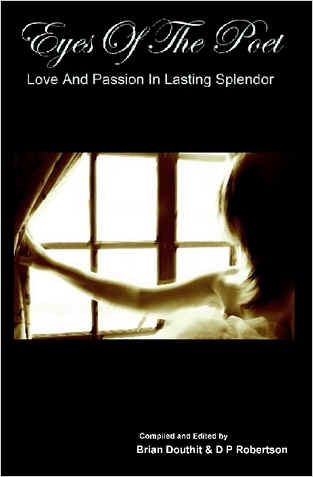
Eyes of the Poet
 Exquisite Lush Perfection, October 17, 2006
Exquisite Lush Perfection, October 17, 2006
"you laugh and
a river of warmth
flows into me
because for now...
I swim in your love"
~Kimberly B. George, When Love Flows
Eyes of the Poet is a book so exquisite, you may find yourself
completely lost within the romantic dream of love, only wishing
to experience everything a poet experiences in moments of
perfection. Brian Douthit and David Robertson have created an
elegant and emotionally fulfilling experience where life is
lived as art and poets play with words in sensual beauty.
This is a collection of poems to celebrate love and passion as
seen by over fifty poets from nine countries including: Canada,
The United Kingdom, Australia, India, The Philippines, South
Africa, Trinidad, The United States and Malta.
Zayra Yves' poetry is breathtaking in beauty and unveils
sensuous beauty in a morning filled with cherry blossoms and a
kiss mingling with tastes of olive oil and basil. Wanda Lea
Brayton brings new beauty to images of reading as she remembers
how her lover turns her pages with a "soft whisper"
and reads her with a "silk-spun touch." The vivid
imagery in "Japanese Garden" makes you long for the
scent of orange blossoms.
"we speak in
breathless whispers
as I trace your lips with my fingertips
searching your eyes
for my soul"
~Rohina Anand, Whispers
Rohina Anand captures warm moments of connection. The lush
intensity in Patricia Gibson-Williams poetry displays a deep
connection with sensual writing. "Eyes of a Poet"
holds some of the most beautiful poetry you will ever read in
its soothing embrace.
This collection takes you beyond sensual creativity and
introduces you to the unique soul of each poet. Exquisite,
intoxicating, comforting and deeply intimate, these poems let
you swim in the soul of the writer like nothing I've ever felt
before. If this book was a delicious secret, it is one you would
want to share with someone you love. The lush imagery truly
speaks for itself and leads you on a poetic journey of the
heart.
"in my winter room I listen
to the night wind
unbuttoning the clouds,
throwing water stars,
blue-tinted liquid florets,
against the window"
~Nicolette van der Walt, Eyes of the Poet
As you finish reading this elegant poetic escape, you may
remember the ending to Diane Anjoue's poem where she captures a
deep heart longing:
"waiting only
to be lost within again..."
~The Rebecca Review

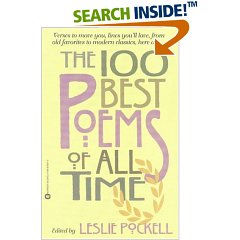
The 100 Best Poems of All Time
 A Classic Poetry Collection that Sings from the Page,
February 18, 2007
A Classic Poetry Collection that Sings from the Page,
February 18, 2007
Leslie Pockell's collection brought back memories from school,
church, college, previous poetry collections and moments in
history not soon to be forgotten. Who could ever forget the
first time they heard "Ode on a Grecian Urn" by John
Keats or "A Visit from St. Nicholas" by Clement Clarke
Moore. These are almost engrained in our culture, as much as
"Amazing Grace" by John Newton and "The
Raven" by Edgar Allan Poe.
Maya Angelou's "Still I Rise" sings from the page:
"Just like moons and like suns,
With the certainty of tides,
Just like hopes springing high,
Still I'll rise.
Did you want to see me broken?
Bowed head and lowered eyes?
Shoulders falling down like teardrops.
Weakened by my soulful cries."
Many of the poems in this collection carry with them this
similar fire, this beautiful tenacity and statement of
individuality within a complex world where poets often reject
the daily call to conform, listening instead to their own
heart's desire.
"I'll walk where my own nature would be leading--
It vexes me to choose another guide--
Where the gray flocks in ferny glens are feeding,
Where the wild wind blows on the mountainside."
~ Emily Bronte's "Often Rebuked, Yet Always Back
Returning"
As I was reading, I could not help but hear the beautiful
singing in many poems, now part of our heritage in the American
songbook. Then there is another type of singing, the singing of
words as they create fascinating rhythms as displayed in
"The Highwayman" by Alfred Noyes. "This Land Is
Your Land" by Woody Guthrie should literally sing to you
from the page as does Julia Ward Howe's poem.
Poems by William Shakespeare, John Donne, Li Po, Sappho, Oscar
Wilde, Rainer Maria Rilke, Rabindranath Tagore, Robert Browning,
Emily Bronte, Thomas Gray, Omar Khayyam, Virgil, Catullus,
William Wordsworth, Samuel Taylor Coleridge and Elizabeth
Barrett Browning all dance on the same stage.
Some of my all-time favorites also appear:
Sea Fever by John Masefield
The love Song of J. Alred Prufrock by T.S. Eliot
Fog by Carl Sandburg
Lake Isle of Innisfree by William Butler Yeats
To His Coy Mistress by Andrew Marvell
Tyger! Tyger! By William Blake
Ozymandia by Percy Bysshe Shelley
She Walks in Beauty by Lord Byron
Ulysses by Alfred, Lord Tennyson
The Jabberwocky by Lewis Carroll
Stopping by the Woods on a Snowy Evening by Robert Frost
"Poetry" by Pablo Neruda captures some of the energy
and fusion in this book:
"And I, infinitesimal being,
drunk with the great starry
void,
likeness, image of
mystery,
felt myself a pure part
of the abyss,
I wheeled with the stars,
my heart broke loose on the wind."
~The Rebecca Review
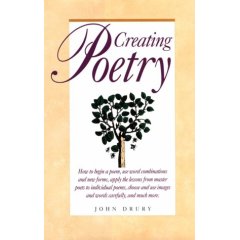
 The Music of Words, October 17, 2006
The Music of Words, October 17, 2006
"The first line of any poem is a kind of door, an entrance
into the rooms of the stanzas, an opening. There are many kinds
of doors, some plain, some ornate..." ~John Drury
Creating Poetry is not a book, it is a muse disguised as pages
of paper within a cover! I cannot express my appreciation enough
for this beautiful gift. John Drury's wisdom and attention to
detail is inspiring and the warmth with which he writes inspires
you to write poem after poem.
You can literally read this book and compose poems instantly as
the inspiration flows through you. I was amazed at how Creating
Poetry invoked the muse so effectively! Most of my poems appear
as a singular thought or moment and then the first sentence will
keep repeating itself until I start writing, then a poem flows
through the pen. Reading this book, you need to keep paper and
pen nearby because poems will appear as if called from a
never-ending well of creativity.
"Some poets do depend on a flash of inspiration, maybe a
good first line, before they sit down to work...waiting is their
discipline. Like all poets, they are constantly preparing for
the poems they will write." ~ John Drury
John Drury explores a wide variety of poetic forms and teaches
poets how to develop style and feeling that will be conveyed to
the reader and enhance the experience. For a long time I wrote
poems without knowing what I was doing. In fact, my first book
of poems appeared so spontaneously, I had no idea I could even
write poems.
One of the suggestions he gives in this book is to read lots of
poems and to indulge in the experience of reading them
frequently. I cannot agree more! He also talks about playing
music while you write. These suggestions are all very helpful.
Some of the brilliant ideas include thoughts on myths. You can
put yourself into the story and write about yourself as a
mythical creature or you could write a poem about a painting or
sculpture. The main sections introduce you to:
Developing your poetic sensitivity
Learning the fundamental tools of poetry
Refining sight - image, metaphor, symbols, vision
Sensitizing yourself to the music of words - alliteration,
assonance, rhyme, sound effects
Developing the rhythmic qualities that make poems sing
Understanding the basic units of which poems are made - visual
shape, stanzas, lines
Taking advantage of poetic forms - Ballad, Haiku, Ode,
Villanelle, Song, Pantoum
Becoming aware of fine nuances - tone, understatement, dramatic
monologue
Opening to potential sources - love, dreams, chance, thinking,
memory, journals
Things to write about - stories, people, occasions, modern life,
objects, subjects
Appreciation for Life - history, science, music, myths,
painting, photographs
Bringing each poem to completion - revision, omissions, endings
Reviewing poetry stirred my interest as I noticed similarities
within the uniqueness of style. What was it that so captured me
in some poems and drew me in deeper into a poet's world? How do
poets create a connection of souls in just a few lines? Often
what a poet needs is an idea and then the full experience
appears.
This book inspired me to write poems about love, silence,
cinnamon, bookshelves, reviewing, bubble baths, candles, travel,
eternity, hunger, dreams, music, friendship, autumn, wolves,
castles, plum blossoms and even a poem about ships in a sea of
emotion.
Reading "Creating Poetry" will inspire you to the
point where reading this book may in fact inspire you to write
50-70 poems! You can read a book and write your own book at the
same time! I'm working on publishing the book this book
inspired, but I keep writing more poems! Creating Poetry Creates
Poets!
~The Rebecca Review
|

Perfectly Said
 Word
Sanctuary, January 2, 2005 Word
Sanctuary, January 2, 2005
Reviewer: TheRebeccaReview.com
Brian Douthit's poems take the reader beyond romance.
This is a world of exquisite feelings immersed in a
profound appreciation of beauty. The pages are saturated
with visions, emotions, desires and deep contemplations
about current events. The honesty of expression mingles
with a breathless depth of consciousness.
As Brian Douthit captures moments, eyes become sapphire
mysteries, nostalgia weaves itself in metaphors and
passionate moments are enveloped in poetic expression.
The soft scent of perfume drifts through the pages like
a mysterious muse wandering in nature.
As I bathe in waves of tranquility
Sweet scented honeysuckle graces the air
And I glance into the mild eyes of impossibility
To see rare beauty, rending the roses to despair
~pg. 36
Sanctuary was the first work of art to capture my
attention. Brian Douthit paints love's sanctuary in a
flowing inspiring honesty. The intriguing format is
aesthetically appealing and is presented in a creative
flow of words. As he conveys his thoughts on love,
romance and beauty, he awakens the reader to the
sublime. Sanctuary left me in a state of breathless
wonder as unveiled emotions ignited my imagination.

Brian Douthit
It is not uncommon to enter entirely new worlds while
reading each poem. "Shout Past the Horizon"
becomes a profound declaration of individuality, while
"An Afternoon with Rain" takes us to a world
where the sky is making love in thunder and lightening.
In "The Religion of Romance," love becomes a
divine expression as the scent of jasmine softly lingers
in a poem filled with emotional complexity.
"Answers to Everlasting Strands" presents
observations about humanity's eternal search for peace.
Brian Douthit also covers topics of fascinating interest
like the meaning of life or conflicts of the soul that
play themselves out in "Midnight Ponderings."
His descriptions of dreams, wildflowers, rainstorms,
dreamy memories and enchanted kisses present ecstatic
notions of love. At times nature almost seems to embody
the connection between souls.
"Perfectly Said" is filled with poems that
delve beneath what meets the eye as the intellectual
dances playfully with the emotional in an ecstatic union
of soul experience.
~The Rebecca Review
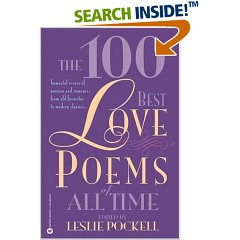
The 100 Best Love Poems of All Time
 Elegant and Classic, March 30, 2006
Elegant and Classic, March 30, 2006
How can I keep my soul in me, so that it doesn't touch
your soul?
How can I raise it high enough, past you, to other things?
I would like to shelter it, among remote lost objects,
in some dark and silent place that doesn't resonate
when our depths resound. ~Rainer Maria Rilke
Leslie Pockell has created a collection of 100 Love Poems
in order to explore the many facets of love's expression.
The poems range from passionate longings to realistic
portrayals (Judith Viorst's True Love). There are images
of love's transcendence and safety. Everything from
ecstasy to grief is included. Classics like To Helen by
Edgar Allan Poe are very familiar.
The River Merchant's Wife by Li Po brings elegant beauty
and Strawberries by Edwin Morgan dips into memories of
storms while eating strawberries in sugar, one of my
all-time favorite poems because of the ending. Katherine
Mansfield's poem about tea is warm and satisfying. The
flow and rhythm in many of the poems is especially
comforting.
The wide range of emotions within the poems also allows
for a few moments of sarcasm (Love 20 Cents the First
Quarter Mile by Kenneth Fearing) and even humor that is
adorably funny. Your Catfish Friend by Richard Brautigan
is witty and cute and looks at love from an especially
creative perspective. This allows for poems with
personality and lightens the heavier content and
melancholy love often reveals.
Complete poems and extracts mingle effortlessly through
the pages. Each poem is accompanied by an insightful
explanation that also sheds light on historical facts and
the life of the poet. In Love Song by Rainer Maria Rilke
we learn of his lifelong melancholy and Leslie Pockell
explains how he is conscious of the distance between
lovers playing an "essential part in sustaining the
mystery of love and life." Her ideas flow with the
poems in a beautiful celebration of poetry. She gives only
enough information to introduce the poem and does not
provide extended commentary.
Poets featured in this collection include: Dante Alighieri,
William Shakespeare, Howard Moss, Christopher Marlowe,
John Milton, Edgar Allan Poe, Robert Burns, Robert Graves,
Rumi, Sir John Suckling, E.E. Cummings, Frances Cornford,
Sir Philip Sidney, Guillaume Apollinaire, Juan Ramon
Jimenez, Walt Witman, Pablo Neruda, William Blake, Robert
Frost, Catullus, Octavio Paz, Tzumi Shikibu, Sylvia Plath,
Li Po, D.H. Lawrence, John Keats, Ted Hughes, Margaret
Atwood and many more...
There are 100 poets featured in this book. Whether you are
a hopeless romantic or enjoy thinking about the many
aspects of love, this book has much to offer. I can almost
guarantee you will find 5 poems to adore, 10 you want to
read again and again and 20 new poets you are happy to
have found.
~The Rebecca Review

Crowned Compassion
 Inspired by the Heart of the World, November 27,
2006
Inspired by the Heart of the World, November 27,
2006
"I have witnessed your long journey
between stars.
I have seen the earth shape a story
under the weight of feet
as the seeker is forever walking
with Love stuck in the throat.
Come into daylight without end
where the face of evil is erased
where kindness lives side by side."
~lines from I Believe in Your Broken Wings
Zayra Yves is a spoken word artist with a unique
connection to sacred sights of the world. She has traveled
in Africa and stayed with influential authors in Southern
Africa who influenced her writing. This CD not only gives
us insight into her beautiful poetry, there is a radio
interview with Tererai Karimakwenda that tells part of the
story of her intriguing life.
Woven between the music of Allen Ross and Mike Thomas,
Zayra Yves presents striking insights in a poetic offering
in which all life is sacred and the sensual becomes holy.
The intensity of the intimacy in the poems is freeing and
statements like: "claim your birthright out of
chaos" shows a spiritual awareness.
"I long to return to the sands where Lions roam, sit
as sun statues
and roar in the night winds.
I have heard them singing of golden rings, of fire in my
belly, while
ashes and petals blew in the alleys with yesterday's
news."
~lines from Faded Hieroglyphs
Her lush sensual images paint landscapes in a melting of
moments where reality blends effortlessly with imagination
to express an inner connection that goes beyond mere
contemplation. These poems are inspired by the heart of
the world and listening to Zyra Yves read her poems
presents new dimensions and gives expanded meaning to each
intricate poem.
~The Rebecca Review
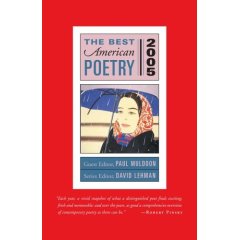
The Best American Poetry 2005
 Vivid Portraits, December 24, 2006
Vivid Portraits, December 24, 2006
"Your burglaries leave no thumbprint
Mine, too, are silent
I do my best imagining at night,
And you do yours with the help of shadows.
Like actors rehearsing a play,
The dark ones withdrew
Into remote corners of the room
The rest of us sat in expectation
Of your burning oratory."
~ from Sunlight by Charles Simic
The maturity of the poems in The Best American Poetry 2005
is instantly apparent the moment you read "In View of
the Fact" by A.R. Ammons. This is a deeply thoughtful
collection of poems best addressed when you are in a
contemplative mood. Within the pages there are many
surprises, lovely conclusions and especially creative
thought patterns. Sexuality and death seem to be themes
throughout, but there is also humor and cleverly designed
rhymes the wittiest poets must long to master.
"Ants" by Vicki Hudspith is especially comical
while Mary Karr's poem about her son is especially
heart-warming and leans more towards a serious realization
of life's complexity within expectation. Richard Garcia's
"Adam and Eve's Dog" lightens a topic most would
find quite serious and Edward Field's poem of praise has a
beautiful freeing conclusion with metaphorical appeal.
"If I were Japanese I'd write about magnolias
in March, how tonal, each bud long as a pencil,
sheathed in celadon suede, jutting from a cluster
of glossy leaves. I'd end the poem before anything
bloomed, end with rain swelling the buds
and the sheaths bursting, then falling to the grass
like a fairy's castoff slippers, like candy wrappers,
like spent firecrackers."
~ Beth Ann Fennelly, pg. 46
What I am most impressed by in this collection of poems,
is the truthfulness and the straightforward invitation
into this sincerity. There is a cleverness in the crafting
of each idea (I Want to be Your Shoebox) and at times
profound lessons can appear through the viewpoint of a
poet who sees the world a little more intensely (The Poets
March on Washington). Jane Hirshfield's "Burlap
Sack" paints an image of bondage and freedom, while
Linda Pastan reveals a different type of cultural freedom.
Paul Muldoon's selections also provide a consistent mood
and his love for rhyme and complex sentence structures
invites you into a world of poems that reveal intricate
details of your own life. At times his selections are
realistic and edgy with mature considerations and at other
times he has selected profound moments to inspire a more
heartfelt appreciation for beauty. Both ideas seem to
weave together to form a painting of how life is really
lived in a realistic setting, as opposed to a more
romantic rendering of ideas within a dreamscape of fantasy
poems. Now and then, a line in a poem is so highly
significant you can read the entire poem and then suddenly
awaken upon a stunning moment.
"Wanting the tight buds of my loneliness
to swell and split, not die in wanting.
It was why I rushed through everything,
why I tore away at the perpetual gauze
between me and the stinging world"
~ pg. 133, Chase Twichell
I can also highly recommend the 2006 edition of The Best
American Poetry, which is enhanced with pop culture
references and a distinctly contemporary mood. As with all
the books edited by David Lehman, the "Foreword"
is well worth reading. David Lehman's experience in the
world of poetry reveals ideas that will be of great
interest to anyone interested in poetry culture.
~The Rebecca Review
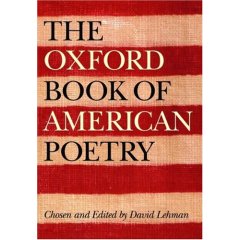
The Oxford Book of American Poetry
 An Invitation into the World of American Poetry,
December 18, 2006
An Invitation into the World of American Poetry,
December 18, 2006
If you love poetry, one book will never satisfy your
hunger or lifelong search for poem perfection. Each book
offers a unique perspective and The Oxford Book of
American Poetry seeks to present an American viewpoint
with over 200 poets revealing their most intimate
thoughts. The poems warmly present insights into the
viewpoint of the poets as they comment on cultural norms
or decry conditions of their times.
The first poems seem to set a tradition of extensive
stories to blend observations in nature with descriptions
of insights into moments. Poems like Henry Wadsworth
Longfellow's "The Bridge" have a soft beauty and
thoughtful reflective quality. "To One in
Paradise" by Edgar Allen Poe is stunning and
revelatory in its romantic appeal. "The Raven"
and "Annabel Lee" also appear.
Many of the poems retain a historical significance and
present a record of the emotions felt by those viewing the
birth of new freedoms. The delicious culinary poem about
"Hasty-Pudding" was a sweet surprise.
"I am the poet of the body,
And I am the poet of the soul."
~Walt Whitman
I will say that I became entranced by Walt Whitman's
enthusiastic portrayal of life and his poems are an
especially luminous moment that spans across many pages,
which are needed because The Song of Myself (1855 edition)
is included and takes up 48 pages! His soul seems to dance
between moments as if infusing all he observes with an
expansive optimism steeped in appreciation for all that he
experiences. I loved these lines from "When Lilacs
Last in the Dooryard Bloom'd:"
"Lilac and star and bird twined with the chant of my
soul,
There in the fragrant pines and cedars dusk and dim."
While most of the first 100 or so pages were completely
new to me, hope dawned as I started to discover familiar
favorites like "Wild Nights" by Emily Dickinson.
"The Road Not Taken" appeared along the way and
"This Is Just to Say" by William Carlos Williams
reveals beautiful images of cool plums from an icebox . My
favorite poem by Elinor Wylie did not make it into this
book, but I was pleasantly surprised by "The
Puritan's Ballad" which is very sensual:
"Within his arms I feared to sink
Where lions shook their manes,
And dragons drawn in azure ink
Leapt quickened by his veins."
If you crave the sensuality of language and longing, there
is much to enjoy. While most of the poems do not focus on
romantic longings, there are quite a few sensual poems.
Denise Levertov explores male longing in his poem:
"The Mutes" where he presents a striking
reality.
"Swan and Shadow" by John Hollander is actually
shaped like a swan on a lake with its reflection and was a
lovely visual surprise. Billy Collins' "Introduction
to Poetry" appears along with "Shoveling Snow
with Buddha" and "Dharma." Rachel Hadas
presents cool crisp images in "Riverside Park:"
"...strolling lovers vanish in the glare
flung from the river by the westering sun.
I can hardly claim to be alone.
Nevertheless, of all whom autumn's new
russet brocades are draping, none is you."
While longing and desire do seem present in many of the
poems, the sheer desire of the poet to communicate the
experiences seems to be the main theme throughout. Dana
Gioia's "Summer Storm" brings a moment as close
to our experience as it can possibly be in a poem. Rain
from a sudden thunderstorm is almost symbolic of a sudden
attraction that is highly memorable.
Some of the poets featured in this anthology include: Anne
Bradstreet, Edward Taylor, Francis Scott Key, Julia Ward
Howe, Herman Melville, Edwin Arlington Robinson, Robert
Frost, Wallace Stevens, Ezra Pound, T.S. Eliot, Edna St.
Vincent Millay, Dorothy Parker, E.E. Cummings, W. H. Auden,
Kenneth Rexroth and Sylvia Plath.
It is my theory that if you find one or two new poems,
then you have succeeded in your reading mission.
Throughout this book I found many poems I not only liked,
but I loved. Most of the poems were completely new to me
and do span such an extensive time period (Poets born
between 1616 and 1950), it is more than likely impossible
to find all these poems in your own lifetime if you were
to try to read a book by each of the poets. This is a much
easier way to find poets you might enjoy and then you can
select a few poetry books by poets you truly think you
will love.
If you enjoy American Poetry, then "The Best American
Poetry 2005" may also intrigue you. I'm working my
way through the "Best American Poetry" series
and have been impressed with how each book paints a
picture of a year in the life of America.
~The Rebecca Review
|

|
|